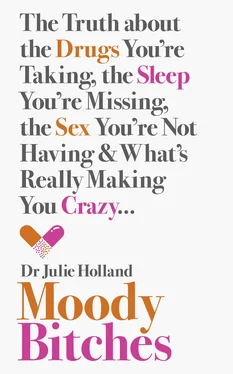Sometimes, if I see a patient with crippling depression or anxiety, then prescribing an SSRI is the right call, but even if it is the best initial treatment, it might not be the forever cure. Feeling deeply may, at times, be difficult to navigate, but it’s also a powerful tool, in the workplace and at home, and it’s essential for growth. We are built to be highly attuned and reactive, and embracing that truth is the first step in gaining mastery of our inner lives and our health.
Hardwired to Feel
Women’s brains develop differently from men’s, and the distinctions make for profound differences in how we process and communicate emotions. All brains develop along the same pathway in the womb, but things change for boys at eight weeks, once the testes become functional. With testosterone in the mix, a surge in the male sex hormone kills off many cells in the communication centers and grows more neurons slated for action, aggression, and sexual drive. In men, these brain areas take up two and a half times the space they do in women.
Even more brain changes occur after gestation, during adolescence, when sex hormones surge, further differentiating the sexes. As the female brain develops, more space and more brain cells are reserved for language, hearing, and memory. Our memory center, the hippocampus, is larger than men’s, perhaps reflecting an evolutionary advantage of remembering details of emotional events and the crucial behaviors of our potential mates, especially what they said they’d do versus what actually happened. Our memories have an influence on our emotions. The hippocampus can calm the hair-trigger responses of the amygdala, the area of the brain devoted to fear, aggression, and anger. The amygdalae are larger in men and have receptors for testosterone.
Ever wonder why you can lose it and then calm down, but those feelings continue to echo for your husband? Women’s larger hippocampi and smaller amygdalae may add up to our having better control over our emotional outbursts than men, particularly when it comes to actions involving fear or aggression. We might react emotionally, but then we pull it together, thanks to the hippocampus.
We are not living in a world that is kind to this sort of behavioral response, though. When under acute stress, the amygdala gains in functionality and the hippocampus loses, one reason you panic and can’t remember as well when pushed. The biggest problems come with chronic stress, where the hippocampus loses not just functionality but brain cells. It becomes atrophied, can no longer quiet the raging amygdala, and then all responses to stressors are amplified. This is what is seen in posttraumatic stress disorder, and it may well be seen in anyone undergoing chronic stress.
Intuiting the motives and feelings of others is an essential social skill that is employed unconsciously and automatically and has been characterized as quintessentially feminine. The better we are at sensing our body’s signs of arousal (feeling our own heartbeat, for example), the better we are at judging emotions in ourselves and others. The insula, thought to be the seat of self-awareness, empathy, and interpersonal experience, helps us to understand others and is noticeably bigger in women. The insula not only helps us process “gut feelings,” to figure out what we and others are feeling emotionally, but also enables us to experience and recognize body sensations. What has often been labeled “female intuition” has served women well in their traditional roles as caregivers and nurturers. The ability to intuit the emotions and desires of others has helped women better predict whether a man may become violent or abandon the children, or whether our nonverbal babies are hungry or in pain.
Men aren’t built to be as sensitive as women are. Women have more brain circuitry not only for expressing language and emotion but also for detecting emotional nuance and anticipating what others are feeling. Given that there is such a gender discrepancy with this empathic system, it’s likely not your imagination that your boyfriend has no idea what he’s feeling half the time (called alexithymia) and has even less facility at communicating it. Testosterone impairs empathy and the ability to intuit others’ emotions by reading their eyes. Being aware of or oblivious to others’ needs is bound to affect how giving a person is, one reason you might think of him as selfish.
We register conflict more deeply than men, and get more stressed out about it as well. No doubt some of this is learned behavior, as girls are often encouraged to keep the peace more than boys, but there is a strong biological component. When men are threatened, their bodies go into “fight or flight” mode, with adrenaline surging to provide energy to muscles. When stress levels are high in women, “tend and befriend” behavior often predominates. Women are more likely to band together in the face of adversity, creating strength in numbers, huddling together to save the children and one another. Oxytocin, the hormone released in women after orgasm and during cuddling or nursing, encourages prosocial, trusting behavior, while testosterone tends to fuel aggressive, competitive behavior. In both men and women, high testosterone levels blunt oxytocin levels, and vice versa, so there is give-and-take between aggression and bonding. Oxytocin’s release affects women more powerfully than men, helping us to be more generous and connected. It also helps us to figure out who is in and who is out of our circle of contacts, our tribe. In hostile environments, or with unsupportive contacts, oxytocin may actually enhance the stress responses, even playing out as aggression toward strangers. Protective mothers’ maternal aggression has been linked to oxytocin, for example.
Girls flock together and keep social harmony, often through language. Staying connected via gossip and verbal intimacy leads to a rush of dopamine, one of the brain’s pleasure chemicals, and oxytocin. Estrogen triggers dopamine and oxytocin production in pubescent girls. Midcycle, these hormones peak, as do verbal output and desire for intimacy. Whereas women tend to discuss troublesome issues with peers, men tend to process their troubles alone, nonverbally. This may reflect the balance of oxytocin versus testosterone. Testosterone inhibits talking and the drive to socialize. For boys, self-esteem comes from being independent, not interconnected. Boys aren’t as communicative, and they aren’t nearly as derailed by conflict and competition. It’s part of who they are, and, perhaps equally important, who they’re expected to be.
The connections between the areas of the brain that process emotion are more active and extensive in women. Women have nine areas devoted to this function, compared with only two in men. Women also have more bilateral processing of emotions in their brains, going left to right, right to left, connecting the analytic and emotional areas, whereas men tend to stay more within each hemisphere. So we could say that women are using their whole brains while men are often using only half of theirs at a time. Women do seem to be better at multitasking than men. Men not only have more difficulty juggling multiple priorities but they are also slower and less organized than women when switching between them.
Men’s brains have more linkages with their cerebellum, the control center for movement, so for men, there may be less time between seeing and doing than there is for women. Men tend to outperform women on motor and spatial cognitive tasks, while women are faster in tasks of emotional identification and nonverbal reasoning. We also outperform men on a “lost key” challenge; maybe this is why our families ask us where everything is, and, more important, why we know the answer. Because men were primarily the hunters and we the foragers, it was crucial that we remembered where we last found the good food.
Читать дальше












